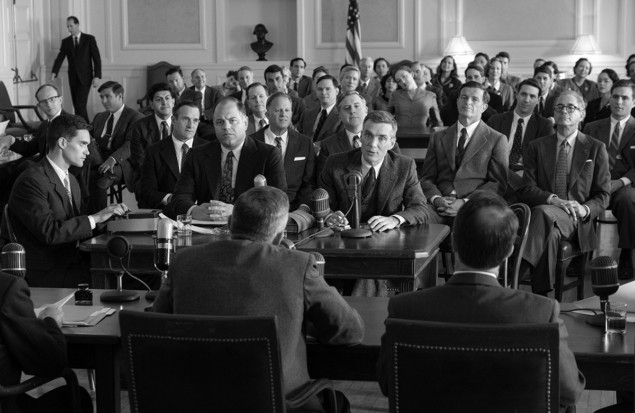US authorities celebrated Robert Oppenheimer for developing atomic weapons but sidelined him when he wanted to advise them on their use. It’s an episode that has many lessons for us today, says Robert P Crease

One of the scariest moments in Robert Oppenheimer’s career was not shown in Oppenheimer, the recent blockbuster movie. That moment occurred during the contentious hearing on his security clearance, which concerned Oppenheimer’s role on a committee to advise the US government on nuclear weapons. Ostensibly about his loyalty to America, the hearing also revealed deeper concerns about his left-wing sympathies and opposition to an early project to build a hydrogen bomb.
Near the end of the hearing is a moment not included in the movie but whose terrifying implications still reverberate
Oppenheimer never regretted his leadership of the Manhattan Project, which built the atomic bombs that were dropped on Hiroshima and Nagasaki in 1945. But he feared that without international control of atomic weapons, developing the (much bigger) hydrogen bomb would trigger an arms race. Political enthusiasts of the hydrogen bomb then revoked his clearance, prompting the hearing, in which the experienced and unscrupulous attorney Roger Robb was appointed to interrogate Oppenheimer.
All this is skilfully depicted in the movie. Near the end of the hearing, however, is a moment that is not included and whose terrifying implications still reverberate. It’s when Robb, in an apparent non sequitur, suddenly quizzes Oppenheimer about John Ericsson, the Swedish-American naval architect who designed ships for the US government during the American Civil War almost a century earlier. Robb asks Oppenheimer whether the fact that Ericsson had designed and built the Monitor, the first ironclad battleship, qualified him to plan naval strategy.
Flummoxed by the bizarre twist, Oppenheimer says “No”. Robb then springs his trap. “Doctor” – superficially appearing to show respect for Oppenheimer’s credentials – “do you think now that perhaps you went beyond the scope of your proper function as a scientist in undertaking to counsel in matters of military strategy and tactics?” Robb was sly, smoothly but falsely equating Ericsson’s qualifications to “plan” military strategy with Oppenheimer’s to “counsel” it, implying that both were equally invalid.
At that moment, Robb was not out just to silence Oppenheimer as a government adviser. That wasn’t necessary; Oppenheimer’s consultancy contract could have simply been cancelled or left to expire – which, ironically, it did at the end of June 1954, one day after his security clearance was stripped at the end of the trial. Robb was after bigger game, which was to prevent any scientist from advising politicians on government policy.
Robb was effectively saying that Ericsson knew how to make boats and Oppenheimer knew how to build bombs – but only politicians and military leaders know how to use them. Keeping the two separate is, Robb believed, the right way for the government to run things.
Though the hearing was a kangaroo court, Oppenheimer could easily have challenged Robb’s argument
Robb had rewritten history, for Ericsson had in fact both build boats and advised how to use them. Ericsson had advised the Secretary of the Navy on strategies for using “little” and “big” ironclads. He wrote of strategies for defending cities on the Atlantic coast and for future wars. He wrote to President Abraham Lincoln and testified before Congress. Sometimes his advice was taken and sometimes not, but the Union benefitted from it.

Though the hearing was a kangaroo court, Oppenheimer could easily have challenged Robb’s argument. In fact, he had started to craft a response on the hearing’s first day, mentioning that an obstacle to scientific advisers was that politicians tended to regard them as academics who were “pleading a special interest”. As Oppenheimer added: “We did plead a special interest, but we believed it to be in the national interest, too.”

Oppenheimer the movie: Physics World writers give their verdict
But he did not get to develop this question of how a nation’s interests can profit from scientists’ special interests because his interrogation was quickly switched to his associations, honesty and loyalty. Had Oppenheimer done so, he would have outlined a plan to have scientifically sensitive politicians and politically sensitive scientists mutually evaluate potential courses of action. There’s no magic trick to make this happen, but arguing why it’s necessary is a start.
Oppenheimer thought that it would happen in America; Robb was out to make sure it wouldn’t. He was afraid that scientific advisers would attempt to intimidate politicians, giving them rules to follow. Scientists develop tools, politicians use them, Robb insisted. Politicians have the right to ignore scientific advice and decide courses of action based solely on their own interests.
The critical point
Today, almost 70 years after that exchange, we need to make the case that Oppenheimer was never able to. Our adversaries of scientific advice charge scientists not with disloyalty but conspiracy, and are captivated not by big bombs but fossil-fuel interests. Some not only admit that they are ignoring scientific advice but campaign on it. We have no magic tricks either, only elections. But without such advice, politicians are blindfolding themselves, discharging weapons without any clear idea of what they are shooting or hitting.
Robb’s dangerous vision is that claimed by many politicians today – that they have the right to ignore things such as what climatologists have to say about global warming or what epidemiologists have to say about pandemics. It’s understandable why the makers of Oppenheimer did not include that moment, for that movie is a drama. Ours is a horror show.
- SEO Powered Content & PR Distribution. Get Amplified Today.
- PlatoData.Network Vertical Generative Ai. Empower Yourself. Access Here.
- PlatoAiStream. Web3 Intelligence. Knowledge Amplified. Access Here.
- PlatoESG. Carbon, CleanTech, Energy, Environment, Solar, Waste Management. Access Here.
- PlatoHealth. Biotech and Clinical Trials Intelligence. Access Here.
- Source: https://physicsworld.com/a/what-the-movie-oppenheimer-can-teach-todays-politicians-about-scientific-advice/
- :has
- :is
- :not
- ][p
- 160
- 2023
- 70
- 90
- a
- Able
- About
- abraham
- academics
- Action
- added
- admit
- advice
- advise
- advised
- adviser
- advising
- advisors
- afraid
- After
- almost
- also
- america
- American
- an
- and
- any
- apparent
- appointed
- ARE
- argument
- arms
- AS
- associations
- At
- atomic
- attempt
- attorney
- Authorities
- based
- BE
- been
- before
- believed
- Beyond
- Big
- bigger
- blockbuster
- bomb
- both
- build
- built
- but
- by
- Campaign
- CAN
- Career
- case
- celebrated
- centre
- Century
- challenged
- charge
- Cities
- civil
- claimed
- clear
- clearance
- click
- Coast
- commission
- committee
- concerned
- Concerns
- Congress
- Conspiracy
- consultancy
- contract
- control
- could
- counsel
- courses
- Court
- craft
- Credentials
- critical
- Dangerous
- day
- decide
- deeper
- Defending
- designed
- develop
- developing
- DID
- do
- done
- Drama
- dropped
- during
- Earlier
- Early
- easily
- effectively
- either
- Elections
- end
- energy
- enthusiasts
- episode
- equally
- Ericsson
- evaluate
- exchange
- experienced
- fact
- feared
- First
- follow
- For
- from
- function
- future
- game
- get
- Give
- Giving
- Government
- Government policy
- had
- happen
- Have
- he
- hearing
- here
- him
- his
- history
- hitting
- horror
- How
- How To
- However
- HTTPS
- hydrogen
- idea
- ignore
- image
- implications
- in
- include
- included
- information
- interest
- interests
- International
- Intimidate
- Ironically
- issue
- IT
- jpg
- june
- just
- keeping
- Know
- lawyer
- leaders
- Leadership
- left
- Lessons
- Lincoln
- Loyalty
- magic
- make
- Makers
- many
- Matters
- max-width
- microphone
- Military
- moment
- Moments
- movie
- much
- mutually
- National
- Nations
- Near
- necessary
- Need
- never
- no
- now
- nuclear
- Nuclear weapons
- obstacle
- occurred
- of
- on
- ONE
- only
- open
- opposition
- or
- ostensibly
- our
- out
- outlined
- own
- Pandemics
- perhaps
- Physics
- Physics World
- Pictures
- plan
- plato
- Plato Data Intelligence
- PlatoData
- played
- playing
- plead
- policy
- political
- politically
- Politicians
- poster
- potential
- president
- prevent
- Profit
- project
- proper
- qualifications
- qualified
- question
- quickly
- Race
- recent
- regard
- respect
- response
- Revealed
- right
- ROBERT
- Role
- rules
- Run
- say
- saying
- says
- scene
- scientific
- Scientist
- scientists
- scope
- secretary
- security
- sensitive
- separate
- ships
- shooting
- show
- shown
- Silence
- simply
- Sly
- smoothly
- So
- solely
- some
- sometimes
- special
- start
- started
- Still
- strategies
- Strategy
- such
- sure
- switched
- tactics
- taken
- tell
- terrifying
- testified
- that
- The
- their
- Them
- themselves
- then
- they
- things
- think
- this
- thought
- thumbnail
- to
- today
- today’s
- too
- tools
- trial
- trigger
- true
- twist
- two
- understandable
- union
- Universal
- us
- us government
- use
- using
- vision
- want
- wanted
- war
- was
- Way..
- we
- Weapons
- went
- were
- What
- when
- whether
- which
- WHO
- whose
- why
- Wikipedia
- with
- without
- world
- would
- writers
- wrote
- years
- you
- Your
- zephyrnet












